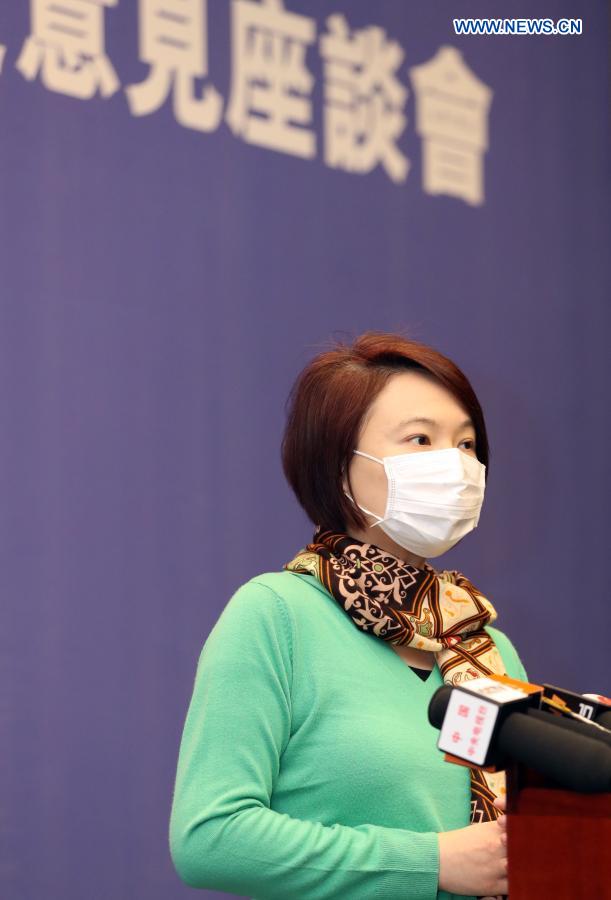
Starry Lee Wai-king, chairperson of the Democratic Alliance for the Betterment and Progress of Hong Kong, meets the press at one of the symposiums held to hear the public opinion about improving the electoral system of the Hong Kong Special Administrative Region (HKSAR) in Hong Kong, south China, March 15, 2021. (Xinhua/Li Gang)
HONG KONG, March 17 (Xinhua) -- Over the past three days, more than 1,000 representatives from various sectors of Hong Kong have expressed their opinions about improving the electoral system of the Hong Kong Special Administrative Region (HKSAR) through symposiums, visits and interviews arranged by the central authorities.
Officials of central authorities' departments have heard the voice of Hong Kong people carefully and sincerely.
The opinion collection came after the National People's Congress (NPC), China's top legislature, adopted a decision on improving the electoral system of the HKSAR last week.
From Monday to Wednesday, 66 symposiums were held in Hong Kong, which gathered representatives from all walks of life, including political figures, business leaders and professionals.
"All opinions are welcome at the symposiums," Zhang Yong, deputy head of the Commission for Legislative Affairs of the NPC Standing Committee, said when speaking at a meeting on Monday.
As the NPC's decision has the importance of landmark to the implementation of "one country, two systems," the central authorities attach great importance to improving the electoral system of the HKSAR and takes a prudent attitude, Zhang said, stressing a "good law" will eventually be enacted after different views are heeded in Hong Kong.
In fact, before the NPC's decision was adopted, the Hong Kong and Macao Affairs Office of the State Council had invited legal experts and experts on politics, among others, from both the mainland and Hong Kong to study the matter. From Feb. 28 to March 1, Hong Kong representatives from all walks of life attended symposiums in Shenzhen to share their views. During the annual "two sessions," related departments of the central authorities also listened to the opinions of NPC deputies and political advisers from the HKSAR.
"The central authorities are sincere and have taken action to listen to the opinions of various sectors of Hong Kong society," Zhang Xiaoming, deputy director of the Hong Kong and Macao Affairs Office of the State Council, said.
It is the common responsibility of the relevant departments of the central authorities, the HKSAR government and legislature, and various sectors in Hong Kong to implement the NPC's decision, Luo Huining, director of the Liaison Office of the Central People's Government in the HKSAR, said, encouraging Hong Kong representatives to express their views freely.
During the meetings, Hong Kong attendees have vigorously put forward their suggestions.
Starry Lee Wai-king, chairperson of the Democratic Alliance for the Betterment and Progress of Hong Kong, highlighted the greater empowerment of the Election Committee of the HKSAR.
Given the deteriorating working environment in the Legislative Council (LegCo) in recent years, entrusting the Election Committee with the function of electing a relatively large share of LegCo members will improve Hong Kong's democracy and enable Hong Kong to focus on developing the economy and improving people's livelihood, which is conducive to Hong Kong's long-term development, she said.
Ng Chau-pei, president of Hong Kong Federation of Trade Unions, proposed that the District Council's seats in the Election Committee should be removed and the District Council should no longer participate in the election of the chief executive or the LegCo.
The District Council's seats in the LegCo should be removed, too, he said.
Ng also believes efforts should be made to increase the size of the Election Committee and optimize its subsectors so that the principle of balanced participation and Hong Kong's overall interests can be ensured.
The share of the labor sector should be expanded as there are around 3.8 million workers in Hong Kong, he added.
Ip Lau Suk-yee, chairwoman of Hong Kong's New People's Party, said the current LegCo still lacks full representation of Hong Kong's high-end financial industry and some key science and technological industries, and she hoped that the future Election Committee will make up the shortfall.
Wong Kam-leung, chairman of the Hong Kong Federation of Education Workers, suggested measures to create favorable conditions for patriotic education through improving the electoral system so that Hong Kong's education sector can be pushed back on the right track.
Participants of the meetings have reached consensus on many areas and unanimously support the NPC's decision, Zhang Xiaoming said Wednesday at a press briefing.
After the implementation of the national security law in the HKSAR and the improvement of the electoral system, Hong Kong will return to the normal path, get out of the political mire and embrace peace and stability, he said.
Ordinary residents in Hong Kong have also expressed their opinions about improving the electoral system of the HKSAR. As of Wednesday morning, more than 700,000 people have signed a petition online in support of the NPC's decision.
HKSAR Chief Executive Carrie Lam said the HKSAR government has set up a special team to speed up related work.
LegCo President Andrew Leung also said the LegCo will expedite the deliberation to ensure the timely passage of related bills so that the upcoming three elections in the next 12 months will be held smoothly. Enditem





